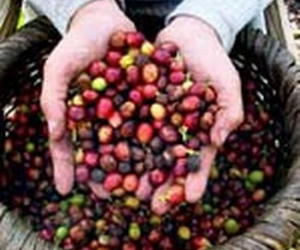Cuba starts coffee harvest early due to storm Isaac
- Submitted by: lena campos
- Business and Economy
- 08 / 30 / 2012

The Cuban coffee harvest began ahead of schedule this week, with farmers scrambling to pick ripe beans over the weekend as tropical storm Isaac bore down on the island and then left a rapidly maturing crop in its wake.
Isaac moved along the north coast of the eastern part of the country on Saturday, home to some 90 percent of the coffee crop, shaking plants and delivering torrential rains before heading toward the United States.
"We picked mature beans as Isaac's winds blew around us, and now we have to move the harvest up because lots of coffee will ripen quickly," coffee farmer Adela Martinez said in a telephone interview from eastern Santiago de Cuba.
Isaac left the crop maturing more rapidly than expected, but otherwise left it unscathed, other sources in the major producing provinces of Guantanamo, Santiago and Granma said.
Losses suffered in the coffee-producing municipality of Maisi, in easternmost Guantanamo province were still being quantified as residents rushed to collect fallen beans.
Cuba produced 7,100 tonnes of semi-processed beans during the 2011-2012 harvest and plans to increase production this season to 8,500 tonnes, according to the Agriculture Ministry.
The harvest usually begins in September, with the bulk of the beans picked from October through January.
Last season's crop was the best in over a decade, as reforms aimed at reducing imports apparently kicked in.
Communist Cuba's 35,000 growers, in exchange for low-interest government credits and subsidized supplies, must sell all of their coffee to the state at prices that historically have been below what the beans fetch on the black market.
Local analysts said 10 to 20 percent of the crop was diverted, though recent increases in state prices may have lessened the flow.
The country's plantations, which at the time of the 1959 revolution produced 60,000 tonnes of coffee, have steadily declined ever since.
Cuban president Raul Castro, as part of his efforts to improve food production and cut massive imports, has pointed to coffee as a crop ripe for increased attention and growth.
Cuba imported 18,000 tonnes of semi-processed beans from Vietnam in 2010 at a cost of $38 million, and a bit less in 2011, though no figures are available.
The state has leased abandoned coffee plantations over the last few years to hundreds of individuals to grow coffee and has nearly tripled the price it pays farmers for their beans.
Cuban farmers are now growing coffee in the lowlands with the aim of both selling to the state and directly to consumers, according to local media.
Plans call for producing 22,000 tonnes in 2015 and eventually 28,000 to 30,000 tonnes a year, equal to levels in the 1970s.
Source: Reuters.com
Comments